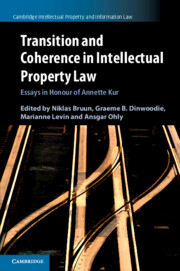Book contents
- Transition and Coherence in Intellectual Property Law
- Cambridge Intellectual Property and Information Law
- Transition and Coherence in Intellectual Property Law
- Copyright page
- Contents
- Preface
- Greetings to Annette Kur from the Second Floor
- Annette Kur: Toward Understanding
- Part I Transition
- Part II Coherence
- A Intellectual “Property” and its Limits
- B IP Overlaps
- C (Un-)fairness
- 34 Geographical Indications as Intellectual Property Rights – Beyond Transition and Coherence
- 35 Presence or Absence of Coherence in Trade Identity Protection in the European Union
- 36 Virtue Ethics and Private Law – A Sketch
- 37 Closing the Gap: How EU Law Constrains National Rules Against Imitation
- 38 European Union Law and Slavish Imitation: An Update in Honour of Annette Kur
- 39 The German Misappropriation Origins of Trademark Antidilution Doctrine: A Translation of the 1924 Odol Opinion of the Elberfeld Landgericht
- 40 The Relationship Between the Unfair Competition Regime and IP Law
- 41 Comparative Advertising: Does Trade Mark Law Over- or Under-Protect the Average Consumer? A Couple of Recent Examples of Asian Jurisdictions Going their Own Way
- Conclusion
- Cambridge Intellectual Property and Information Law
37 - Closing the Gap: How EU Law Constrains National Rules Against Imitation
from C - (Un-)fairness
Published online by Cambridge University Press: 29 December 2020
- Transition and Coherence in Intellectual Property Law
- Cambridge Intellectual Property and Information Law
- Transition and Coherence in Intellectual Property Law
- Copyright page
- Contents
- Preface
- Greetings to Annette Kur from the Second Floor
- Annette Kur: Toward Understanding
- Part I Transition
- Part II Coherence
- A Intellectual “Property” and its Limits
- B IP Overlaps
- C (Un-)fairness
- 34 Geographical Indications as Intellectual Property Rights – Beyond Transition and Coherence
- 35 Presence or Absence of Coherence in Trade Identity Protection in the European Union
- 36 Virtue Ethics and Private Law – A Sketch
- 37 Closing the Gap: How EU Law Constrains National Rules Against Imitation
- 38 European Union Law and Slavish Imitation: An Update in Honour of Annette Kur
- 39 The German Misappropriation Origins of Trademark Antidilution Doctrine: A Translation of the 1924 Odol Opinion of the Elberfeld Landgericht
- 40 The Relationship Between the Unfair Competition Regime and IP Law
- 41 Comparative Advertising: Does Trade Mark Law Over- or Under-Protect the Average Consumer? A Couple of Recent Examples of Asian Jurisdictions Going their Own Way
- Conclusion
- Cambridge Intellectual Property and Information Law
Summary
If imitation was simply bad, society could just proclaim it unfair. But it is not. Imitation is a lifeblood of economy and culture.2 It fuels progress because it facilitates diffusion of new ideas. As much as innovators push the boundary of our knowledge, imitators help to disseminate it. Intellectual property rights are a tool for achieving balance between innovators and imitators. They try to motivate innovators to come up with new ideas and commercialize them, while keeping imitators at bay for a while. This artificial lead time allows them to recoup R&D investments so that they are economically motivated to innovate again.
- Type
- Chapter
- Information
- Transition and Coherence in Intellectual Property LawEssays in Honour of Annette Kur, pp. 436 - 446Publisher: Cambridge University PressPrint publication year: 2021

